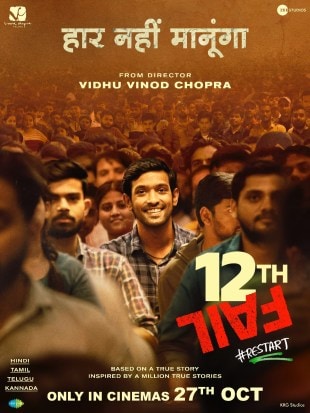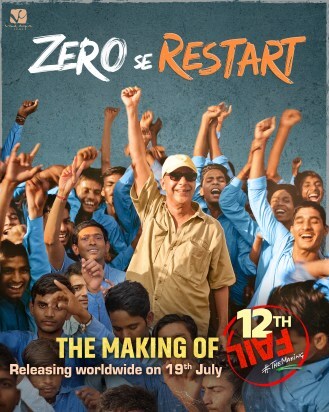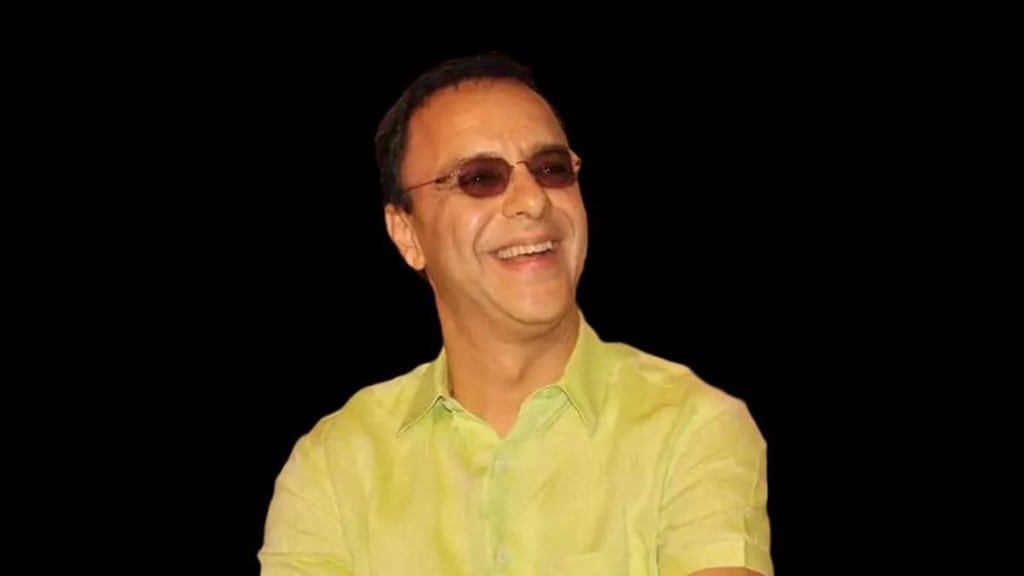As a journalist delving into the intricate tapestry of cinema, one often finds oneself navigating a labyrinth of schedules, deadlines, and unexpected twists. Yet, amidst the chaos, there are moments that stand out—moments that offer a glimpse into the profound passion and dedication of those who shape the silver screen. My recent encounter with acclaimed filmmaker Vidhu Vinod Chopra was one such moment—a testament to the indomitable spirit that fuels creativity in the face of adversity.
In the bustling world of entertainment, securing an interview with a luminary like Chopra is akin to capturing lightning in a bottle. Yet, as fate would have it, our initial plans for an in-person or Zoom interview were thwarted by the relentless demands of Chopra’s schedule. Undeterred, I opted to send my questions, hoping to elicit a response that would offer a glimpse into the mind of this cinematic maestro.
To my surprise and delight, mere moments after dispatching my queries, my phone rang—an unexpected call from none other than Vidhu Vinod Chopra himself. Expressing his appreciation for the thoughtful questions I had posed, he extended a gracious invitation for an in-person interview—a gesture that underscored his genuine enthusiasm for engaging with the press and sharing insights into his craft.
As I reflect on our conversation, I am struck by the depth of Chopra’s commitment to storytelling and the profound impact of his cinematic oeuvre. Each response he offered was imbued with a sense of purpose—a testament to his unwavering dedication to his art. From his candid reflections on the importance of every film he creates to his insights into the challenges and joys of filmmaking, Chopra’s words resonated with an authenticity that is rare in an industry often characterized by artifice.
Excerpts from the interview:
Why 12th Fail is an important film for you and what does its success mean to you?
Answer – Every film that I make is an important film to me whether it be ‘Shikara’ or ‘Parinda’ or ‘Munna Bhai MBBS’, ‘3 Idiots’, ‘1942: A Love Story’ all the films are important. They are the most important thing in my life when I’m making them. So yes, it is important.
The success of 12th Fail means more to me than the star-driven films that I’ve produced because it tells me that if you make a good film a lot of good people out there will see it. And make it into a silver jubilee hit which is a miracle.

What made you choose Vikrant Massey as your lead?
Answer – I think he is one of the best actors that we have, that’s the simple answer.
You once said in an interview that you work with actors and not stars – Please elaborate.
Answer – Yes, and I proved it in ‘12th Fail’. I didn’t work with stars, I worked with an actor. So what do they say in hindi “Jo main bolta hoon vo main karke Dikhata Hoon” (laughs).
Can you share your thoughts on the challenges and advantages of making small-budget films compared to big-budget productions?
Answer – Well, it is very important that you budget your film at the first phase itself and then move onto its making. But what matters more than the numbers is what is that you’re trying to say through the movie, and to stay honest on that path. Don’t make projects, make films. That’s what you came here to do. Be it a small budget or a big budget film, there will always be a set of challenges for both. But it’s important to stay true to your calling, and think with a spreadsheet.
How did it all start? What inspired you to become a filmmaker, screenwriter, producer, and editor…
Answer – That’s a very long story and I will have to go back. I think you should read my book Unscripted. But it all started in Kashmir where I was born and brought up. I was a young kid who dreamt of making movies and my father was very upset with me because there was no way he thought I could come to Bombay. He wanted me to become a doctor because I was very good in my studies and of course he had no money to send me to Bombay or to the Film Institute. So, yeah it was a crazy dream. Completely crazy! And then I fooled my father, I failed pre-medical so he couldn’t get me into a medical school. And then I topped the University. I was first class pass in Economics Honors and I became the National Scholar of India. I got 250 bucks’ scholarship from the government of India and with that money I went to the film school. It’s a long journey simplified for you. It’s been great fun to be where I am from, and where I have come.
Your films often explore deep human emotions and societal issues. What drives you to tell such poignant stories?
Answer – My life. As simple as that. I am not here to make a movie to sell. Like I said I make movies, I don’t make projects. And I think people who make projects are very sad people. I don’t think deep down they are happy; they can’t be.
Can you share insights into your creative process, from conceptualizing a film to its execution on screen?
Answer – Well the first thing for me is what is the film saying. That is the first idea that comes to me when I think of any film. The important thing is – what is the message of the film. Like there was All is Well in ‘3 Idiots’, there was Jaddu ki Jhappi in ‘Munna bhai MBBS’ – so every film must say something. ‘Parinda’ said Violence Begets Violence so what is most important for me is what is ‘12th Fail’ saying and that is Haar Nai Manunga and Zero Se Restart to me is the essence. Actually, my next film that I’ll be releasing is called Zero se Restart. It is based on the making of 12th Fail. I am editing that film these days. So for me the important thing is what is the message you’re giving to people while you entertain them.

Many of your films, like “3 Idiots” and “Munna Bhai” series, blend comedy with social messages. How do you strike a balance between entertainment and delivering a meaningful message?
Answer – The important thing is not the message. Message is the wrong word. What are you saying in the movie, that to me is the intention of the movie. Why are you making the movie? I never make a movie to make a few 100 crores. Of course my films make a lot of money but that is not my intention that is not my driving force.
“Parinda” is often hailed as one of the greatest Indian gangster films. What challenges did you face while making it, and what makes it special to you?
Answer – The biggest challenge was I had no money. That film was made in 12 lakhs, that’s it. I got 12 lakhs loan from NFDC and that time it was called FFC so I had very little equipment, almost very little for sets, it was crazy. The fire that Nana gets engulfed with, we couldn’t afford a digital fire so it was real fire and Nana actually got burnt so it’s crazy. When we were shooting, in the middle of the sea me and my camera man Binod Pradhan were in a dingy boat, we got lost in the sea on New Year’s because we didn’t have the equipment or walkie talkies, not even a motorized boat to shoot. Can you imagine, it was completely crazy.
1942: A Love Story will complete 30 years on April 15. Do you remember what was it like directing the film with Anil Kapoor and Manisha Koirala? What a beautiful film it is. I still watch it on days I want to enjoy good cinema.
Answer – 30 years OMG, my god! Eshita, thank you so much for reminding me it’s 30 years because I cannot believe it’s been 30 years, it seems like yesterday. But yes, it was great fun to direct all those people Manisha, Jackky, Anil, oh my god so many of them – it was the first time ever we built that set. Nobody had ever made such a big set till ‘1942: A Love Story’ happened and of course after that Sanjay Bhansali who assisted me there has been making big sets. But that was the first one. We had never seen such a big set till then. I’ve always enjoyed whichever film I have done, and I thoroughly enjoy 1942. And I think some of the music that RD did and some of the songs that Sanjay did and some of the performances that Anil and Jackky and Anupam Kher, Manisha and all of them were absolutely excellent – I loved making that film like most films… I love making them.
Your filmography spans various genres. Is there a particular genre you have yet to explore but would like to in the future?
Answers – Yes, I want to make a horror film. I haven’t done horror, and I am going to do a horror before I die hopefully.
The music in your films often becomes iconic. How do you approach integrating music into your storytelling?
Answer – I only use music that is music of my soul, the music that I like. What is happening now again, people think – Oh ye chalega toh yeh music banate hai. Now you see the music of ‘12th Fail’, look at that Bolo Na song, it’s done so well. Look at the reach, it’s very simple, it comes from the heart. I make music that I can hum. I make music that I like to hear not what I think will be a big hit. Or some music company telling me what the whole world wants to listen to this kind of music. You should make a film that you want to see, you should make a song that you want to hear. Sanjay Leela Bhansali also makes music like that, that he wants to hear and that’s how it should be.
In today’s rapidly evolving film industry, what do you believe are the changing expectations of the audience, and how do you adapt your storytelling to meet those expectations?
Answer – I think finally the audience that goes to see a movie wants to see a film in which they are entertained, that’s the most important thing. And be engrossed in it, which is the second important thing. And hopefully educate, while you are entertaining and engrossing them. That’s all I aspire to do in my films. The audience will change, and the times will change but one basic thing is when you tell an engrossing story whether it’s Shakespeare or whether it’s today’s times, any film or any filmmaker, it has to involve the people watching that film or reading that book.
How do you balance artistic vision with commercial viability when choosing projects to pursue?
Answer – I don’t think commercial. If I did, I wouldn’t make ‘12th Fail’. My film become commercial hits, but I don’t think commercial (laughs). That would be a very sad day if I think commercial.
How do you perceive the role of technology and digital platforms in shaping the future of cinema, and how do you stay innovative in this landscape?
Answer – I stay innovative by disconnecting myself totally from the reality of digital platforms and stuff like that because that reality is simply how much are you making a movie for, how much are you selling it for, how much are you going to make out of it. That’s not my reality. My reality is I want to make a film that I want to make. If they like it, I am very grateful, if they don’t like it, that’s fine. I don’t want to be on any social judgement. I just want to make good movies till I’m alive.
What are your thoughts on the importance of storytelling in today’s society, particularly in the context of cultural exchange and social change?
Answer – The importance of storytelling in this cultural stage is what are you saying through your story, and what is the message of that movie. It’s all about what you are saying. Every film that I have done has something to say and to me that is the most important thing to me in my life. There is an old hindi song which says, ‘Kuch toh kahani chodh jaa, mausam beeta jaaye’. So you really want to leave something behind, something which is good for everyone.
What does box-office mean to you?
Answer – It means nothing to me. If I start thinking about the box office, I will not make the movie that I make. But when the movies do well like ‘12th Fail’, I feel very good. So what it means is if I make a movie that does well of course I feel good. But I never think of box office numbers while I am making a movie. Like I said if it meant anything to me, I would make ‘Munna Bhai 3’ I would not make ‘12th Fail’, common sense. I would have made ‘3 Idiots 2’. However,the box office has been kind to me, and I hope it stays kind.
You are also a producer, can you please explain to my audience the role of a producer in a film – They are a lot more than someone who just puts in money.
Answer – Well actually, I should never be called a producer. I should be called a co-creator because, in all the films that I have produced whether it be ‘Parineeta’, ‘Munna Bhai MBBS’, or ‘3 Idiots, anything, I have co-created. I sit in the edit, in the script and money is not something I deal with frankly. Like all Raju Hirani films, Raju decided the money. There was a budget yes. So, I would like to believe that I am a co-creator. I would change my title if I could. That is how I make movies in collaboration.
We’ve seen that reducing the price of tickets helps in attracting audiences to the cinema. But how does it impact box office collection?
Answer – This again is a question not for me, I have no idea. You should ask people at Zee studios and other companies. I don’t think of all that. I cannot really answer that.
What’s next?
Answer – I am writing 3-4 films. One of them which tells the relationship between boss and the servant, another one is a thriller and also a horror film that I am writing. One of them will happen hopefully soon. I always begin with 3-4 movies in my head and slowly progress towards what possesses me the most.
